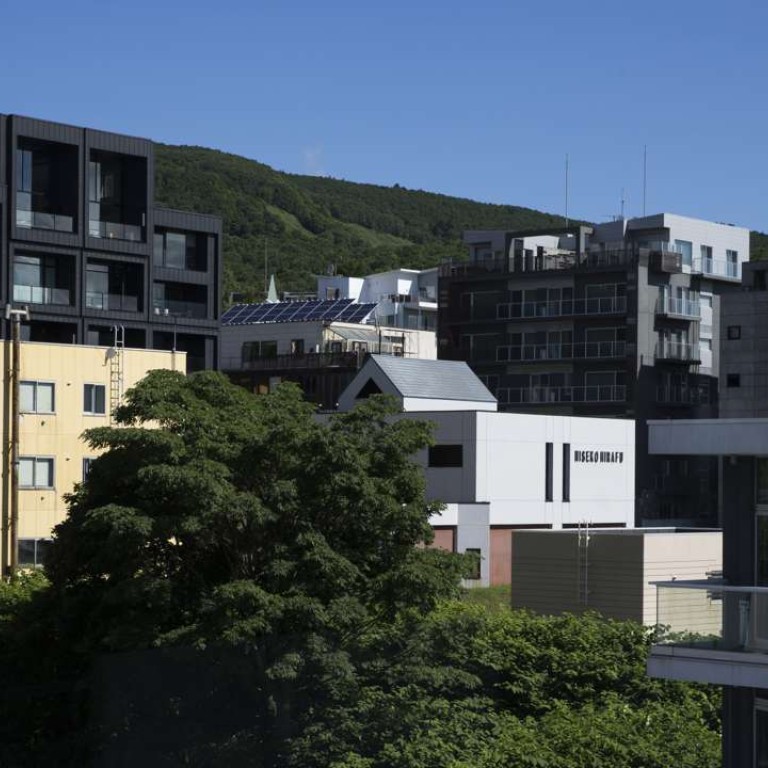
Japanese real estate set for downturn beginning next year, Jefferies says
Fund house downgrades real estate sector to ‘underweight’, warning prime office rents set to cool while apartments prices are already stretched
Japan’s real estate market will likely reach its peak late next year before succumbing to structural headwinds, according to Jefferies, which downgraded its outlook for the Japanese real estate sector to underweight, citing weakness in office lease rates and condo sales.
Real estate developers have ranked as the third worst performing sector among the 33 Tokyo subindexes during the past three years, tumbling 7.4 per cent versus a 15 per cent gain in the Tokyo Stock Price Index.
A business downturn brought on by a stronger yen, a depressed global economy and financial uncertainties are among reasons for slumping demand for prime office space, according to Jefferies analyst Chang Han Joo.
“The slowdown in demand, coupled with large increases in supply, is bound to put pressure on rents and vacancy rates,” Joo said.
Analysts expect vacancy rates to increase from the third quarter and rents for class-A buildings to peak out in the current cycle late next year. According to a survey of large office buildings in Tokyo, average new supply will be 5 per cent higher in the next five years compared to the past five years. But there will be “limited incremental demand” for class-A office spaces, which is bad news for Japan’s three major developers, since 65 per cent of their profits come from office spaces, Joo said.

For condos, increased land prices will force developers to sell condos at rising prices, causing affordability to be a problem, according to the report.
Rising land prices also add up to a squeeze on the condominium market. Developers unable to pass along higher condo prices in a city where affordability is already stretched at 11 times household income are left with shrinking profit margins.
This expected downturn in the Japanese real estate market comes as an increasing number of Hong Kong and Chinese investors have cast their eye towards Japanese opportunities, amid high housing prices in Hong Kong and the depreciation of the yuan. China is now the No 2 investor in overseas properties, and Hongkongers say Japan is the country they would be most interested in making property investments, according to a 2016 YouGov survey.
Victor Yeung, chief investment officer of Hong Kong-based asset manager Admiral Investment, is bullish on Japanese real estate, saying around one-third of the assets from the real estate investment trust he oversees is invested in the country.
“Some of the demand is going back into the Chinese markets, but we’re still seeing a healthy volume in Japan for now,” he said.
Japan’s key issue is long-term inflation, which Yeung said has been the major indicator for the performance of the real estate market in the last 20 years.
“To the extent that the government can maintain a healthy level of inflation, we are not too worried,” he said.
Landscope Christie’s International Real Estate chief executive Koh Keng-shing said Japan will likely continue to draw strong interest from Hong Kong investors. In the last three years, Christie’s has had more than 100 investors looking for en bloc investments, or multiple units of properties, mostly over HK$5 million, Koh said.
Koh said yields for Tokyo property investments can range from 4.5 to 5.5 per cent, and even reach 6 per cent, almost double what renting in Hong Kong can return.
“The Japanese market is mature, it’s sophisticated, it’s transparent,” he said. “And you have all of the necessary infrastructure is place.”
Global investors are also betting on Japan. The UK-based M&G Real Estate, one of the world’s largest property investors, announced Tuesday that it completed two transactions in Japan worth US$123.6 million (HK$958.9 million).
“Japan is a key market for us,” M&G Real Estate Asia chief executive Chiang Ling Ng said.
Japan’s market will also be affected by the upcoming Tokyo Olympics in 2020, which Jefferies analysts believe will help Japan’s construction sector to keep “booming,” while Yeung says infrastructure spending is a boon for property investments.
“Naturally, real estate will benefit from that,” he said.
And with global economic uncertainties following Britain’s vote to leave the European Union, Japan is one of the places investors “would regard as a safe haven,” Koh said.
“I don’t have a crystal ball,” he said, noting Japan’s real estate market will consolidate in the short term. “But next year, it will continue its gentle uprising.”

